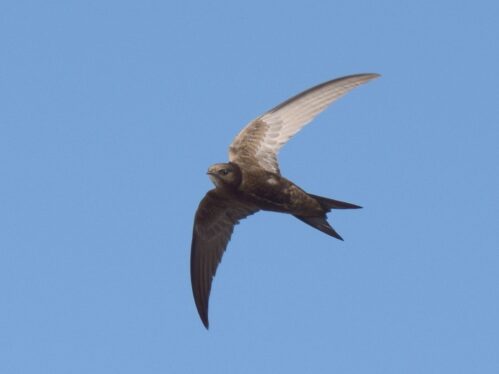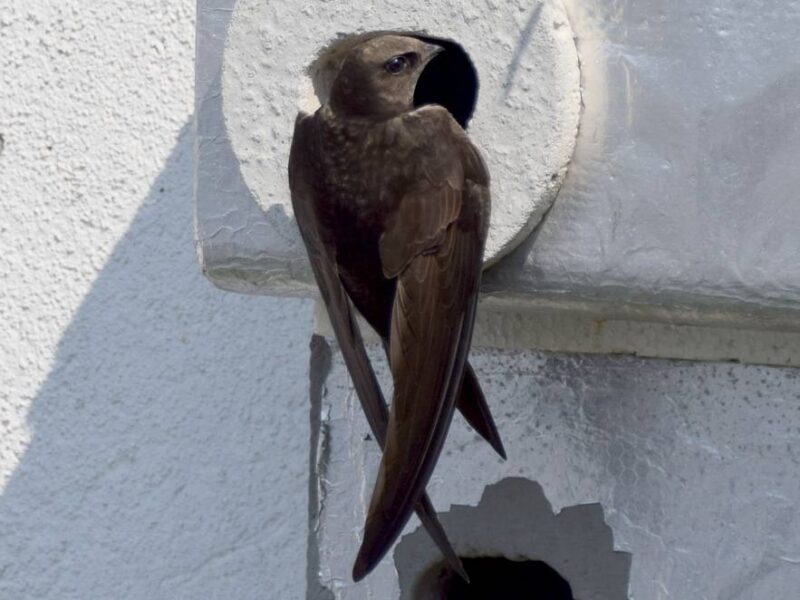Copyright © Klaus Roggel Courtesy of www.swift-conservation.org


Wildlife
Birds > Swifts
______
Swifts are in serious trouble. The UK has seen numbers dramatically fall by over 50% since 1995. YACWAG is launching a project to help them continue to spend their summers in Yatton and Congresbury. Everyone can get involved in helping.
YACWAG’s Swift Project
Launching 2023
Why do swifts need our help?
Swifts are undergoing startling national declines that have seen them added to the UK Red List of Birds of Conservation Concern in 2021. Over half of the UK swift population has disappeared from our skies in the past 25 years, and our local population has followed the same trend.
While research continues into the reasons for this, the loss of their nest sites is thought to be a major factor. Swifts have lived alongside people for centuries, nesting in cavities in our buildings behind roof tiles and eaves. When buildings are refurbished these spaces are often lost, and modern design of new buildings generally doesn’t consider the needs of swifts. Swifts pair for life and return to the same nest sites year after year, so when nest sites are blocked or lost it is difficult for them to adapt, find a new site and breed successfully.
Changes in insect food may also be having an effect. Swifts fly high in the air and feed on insects including flying ants, spiders, mosquitoes, moths, aphids and beetles. Many insect populations are in decline due to habitat loss and the widespread use of pesticides.
It is very difficult to attract swifts to nest again in a community where they have already been lost. Urgent action is needed if we are to keep nesting swifts in Yatton and Congresbury.
What is the YACWAG Swift Project about?
We want to give swifts the best possible chance to survive and thrive in our local area by:
- Raising awareness and understanding of swifts and inspiring people to take a range of actions to help support swifts
- Supporting the local swift population by providing nest boxes and ensuring there are integrated swift bricks in any new developments
- Improving our knowledge of local swift numbers, behaviour and nesting sites
How can I take action to help swifts?
- Install your own swift box or boxes
Our partners Nailsea Shedders and their fantastic volunteer team have constructed 20 swift boxes to be installed in areas of Yatton and Congresbury where there are already nesting swifts, to help support swift colonies. We are focusing on areas close to where swifts already nest:
Yatton: Derham Park and Derham Close; Barberry Farm Road and northern part of Stowey Road; Wakedean Gardens; Heathgate; Cadbury Farm Road
Congresbury: Wrington Lane; The Causeway
We have all the swift box hosts we need for this year, but you can still purchase and install swift boxes yourself.
Check out www.bristolswifts.co.uk and www.swift-conservation.org for advice.
- Email dick.newell@gmail.com re Action for Swifts re lightweight, long-lasting uPVC boxes
- www.impeckable.co.uk for rot-proof GRP moulded swift boxes guaranteed 50 years
- RSPB garden bird nest boxes for a wooden box
- Be a Swift Champion
Anyone can be a Swift Champion! There are lots of other ways you can help swifts, including:
- Recording nesting swifts and swift screaming parties on Swift Mapper
- Signing this petition to make swift bricks, which are special bricks that provide a nesting space, compulsory in all developments
- Talking about swift bricks and nest boxes with any neighbours who are having building work done
- Contacting North Somerset Council and your local Parish Council to tell them you want them to stop the use of pesticides which are known to cause harm to insects, including those that the swifts depend on.
- Help insects in your garden
By gardening with wildlife in mind, you can look after the flying insects that the swifts feed on. Flying insects are thought to have declined by 76% since 1990. YACWAG has plenty of wildlife-friendly gardening tips to get you started.
Amazing swift facts
- Swifts are the fastest of all birds in level flight, and hunt at around 25mph
- Swifts are in the UK for only around 3 months of the year and breed here, spending the rest of their time in Africa
- Swifts have moveable bristles around their eyes that act as ‘sunglasses’
- Swifts eat, drink, mate and even sleep on the wing and almost never land, except when they are nesting
- Every bolus (ball of food) that parent swifts bring to their babies contains between 300 and 1,000 individual insects and spiders
- Baby swifts do ‘press ups’ in the nest to strengthen their wing muscles ready for flight
© Copyright YACWAG, or original authors. All rights reserved. | Registered charity 1076362 | Privacy policy | Cookie policy | Terms & Conditions |Web design: StanfordGraphics



